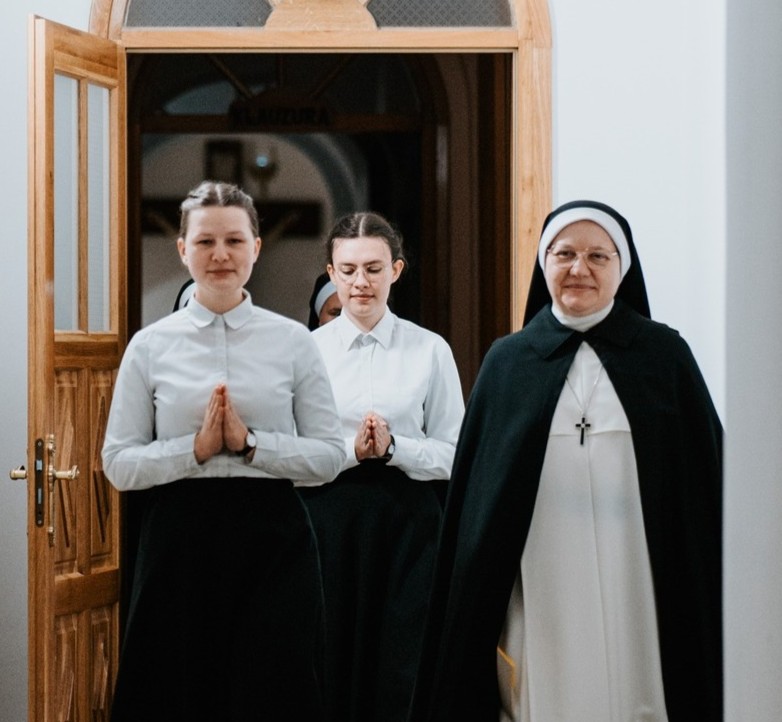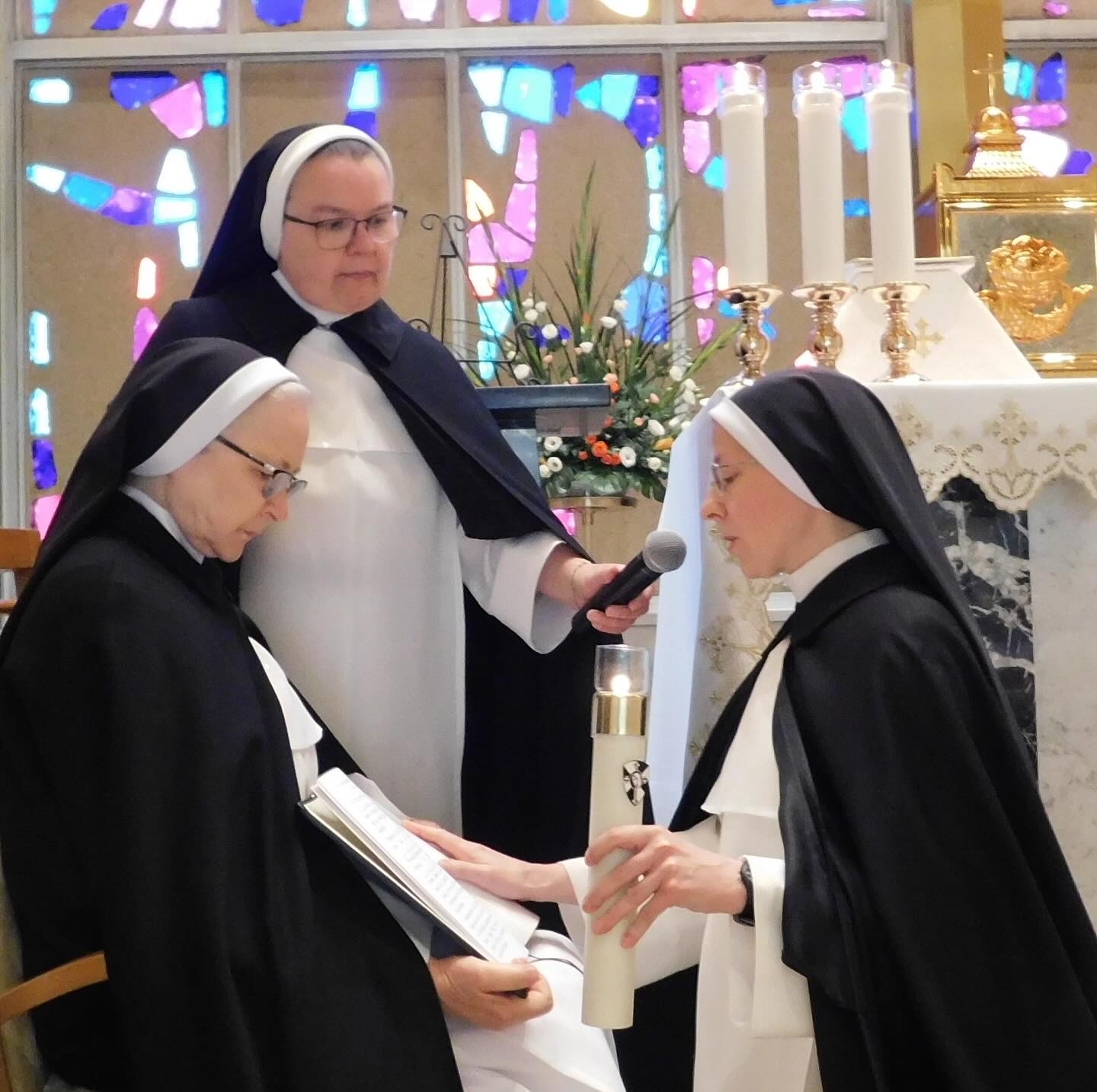
Do you feel like you were made for something more? Does nothing satisfy? Are you feeling unsettled and unhappy even though you are preoccupying yourself with things you like? Do you feel God tugging in your heart? Do you feel Him calling you even though you are afraid of what that might mean? Perhaps Jesus might be calling you to religious life!
Religious life is a profound commitment of love to God, who calls us to a deeper purpose. By embracing this path, we offer ourselves fully and trustingly to Him, without reservation or conditions.
Do you need someone to speak with regarding your vocation? Do you feel stirrings in your heart and do you need help pondering them? Email us! We would love to walk with you!
I can do all things through him who strengthens me.
Discerning religious life requires active engagement. We cannot fully know God’s will unless we intentionally seek it. The journey of discernment involves both prayer and action, opening our hearts to His guidance. Here are several ways to begin actively seeking God’s will towards religious life.
If Jesus is calling you to Himself, trust Him to lead you. He is the Way, the Truth, and the Life, and He longs to draw your heart closer to His. Now is the moment to nurture your spiritual life with care and attentiveness. Spend time in prayer, attending daily Mass whenever possible, and seek the quiet intimacy of Holy Hour more often. Frequent the Sacrament of Reconciliation, allowing His mercy to renew you. Let the Holy Rosary guide you into the depths of Jesus’ Heart, meditating on His love, His sacrifice, and His tender care for you especially through the guidance of Our Lady, His Mother. In these practices, you will hear Jesus' voice more clearly and discern His call with peace and clarity.
When facing significant change in life, it is wise to seek guidance and support. Find a spiritual director who can gently help you navigate your thoughts and desires. You may also consider speaking with the vocation director in your diocese, or simply have a heartfelt conversation with your pastor—sometimes the simplest conversations can illuminate the path ahead. You may also reach out to vocation directors of women’s religious communities online, asking for their wisdom and insight. Do not let fear hold you back from exploring a possible call to religious life. Trust that God walks with you in every step, gently guiding your heart toward His will.
After much prayer, discernment, and reflection, it is important to follow the holy desires God places in your heart. If you sense Jesus calling you to be His Bride, take concrete steps to respond to His invitation. Begin by researching a few communities that inspire you, reach out to them, and plan a visit. Often, it is through personal visits and retreats that God gives the clearest guidance, helping your heart discern His will with greater clarity and peace.

The vow of chastity is not merely a renunciation of marriage, but a profound act of love ordered toward God and His Kingdom. Rooted in Christ’s own example of celibate love, it signifies an undivided heart, wholly consecrated to serving God and neighbor without the attachments and obligations of exclusive human relationships. St. Thomas Aquinas teaches that chastity frees the soul for contemplation, while Vatican II affirms it as a sign of the world to come, where God will be “all in all.” Far from a denial of love, chastity enlarges the heart, allowing it to be available to all and to mirror the universal charity of Christ, who loved with a pure and total gift of self.

The vow of poverty is more than simply renouncing personal wealth—it is a radical act of trust in God’s providence and a deliberate sharing in Christ’s own self-emptying. By freely giving up ownership and living with simplicity, a religious person witnesses that true security and fulfillment are not found in material possessions but in God alone. This poverty is not meant to demean human needs, but to reorder them, so that the heart is undivided and free for love—especially toward the poor, who hold a privileged place in God’s Kingdom. In imitating the poverty of Jesus, who “though He was rich, became poor for our sake” (2 Cor 8:9), the vowed religious becomes a living sign that eternal treasures far outweigh earthly ones.

The vow of obedience is a loving surrender of one’s will to God, expressed through faithful adherence to the legitimate commands of one’s religious superiors and the teachings of the Church. Far from being blind submission, it is an act of trust that God’s Spirit works through the structures of the community and the guidance of those appointed to lead. This obedience mirrors Christ Himself, who “became obedient unto death, even death on a cross” (Phil 2:8), revealing that true freedom is found in doing the Father’s will. By embracing this vow, a religious commits to listening deeply—ob-audire, “to hear toward”—and to following God’s call with humility, unity, and readiness, becoming a living witness that love is perfected in self-giving.
Stages of formation

![[team] image of team member (for a buddhist monasteries & temple)](https://cdn.prod.website-files.com/6823f41661a586994c58a7ce/689e3242f85469ecf689392f_novice%201.jpg)


Formation in religious life is essential because a vocation is not simply a personal decision, but a lifelong journey of being conformed to Christ and integrated into a particular spiritual family. Entering religious life means embracing a radically different way of living—rooted in the vows, in community, and in the mission of the Church—which requires intentional preparation of the heart, mind, and habits. Formation helps candidates grow in prayer, self-knowledge, theological understanding, and the virtues needed to live the vows faithfully. It also allows time for discernment, so both the individual and the community can confirm the authenticity of the call. In short, formation is the soil in which the seeds of a vocation are nurtured, ensuring that when a person professes vows, they do so with maturity, freedom, and deep spiritual grounding.
The first formation period, called aspirancy, lasting six months. During this stage, candidates gradually participate in the life of the community by attending prayer, assisting with community works, and engaging in the apostolate. The purpose of aspirancy is to provide space for prayerful discernment, allowing the candidate to reflect on whether she is truly called to religious life and specifically to the congregation. If she recognizes this as the Lord’s will, she moves forward into postulancy.
In postulancy, the candidate begins a more structured introduction to the life of the community. This period typically lasts for a year. Postulants participate more fully in community prayer, apostolic works, and the daily routine of the congregation. The goal of postulancy is to deepen discernment, enrich the candidate’s understanding of the congregation’s charism and Dominican spirituality, and prepare her for the more intense spiritual and communal life of the novitiate.
The novitiate is a time of intensive spiritual formation, usually lasting one to two years. Novices receive deeper instruction in the vows, the history and spirituality of the institute, and the practical life of religious living. They adopt the habit of the community as a visible sign of their commitment. The novitiate is a period of focused prayer, study, and guidance, allowing the novice to internalize the charism of the institute and test her vocation more profoundly before making temporary vows.
After completing the novitiate, the novice may take temporary vows, usually for one to six years, which are renewable. During this stage, the religious lives fully in the community, participates in all ministries, and continues her formation through study, spiritual direction, and apostolic work. This period helps the religious integrate her personal growth with the life and mission of the institute.
After discernment and fulfillment of the temporary profession period, the religious makes perpetual vows, committing herself for life. Formation does not end here; ongoing formation continues, addressing spiritual, intellectual, and apostolic growth, so that the religious can remain faithful, effective, and spiritually mature in her lifelong vocation.
Permanent formation is the ongoing process of growth that continues throughout a religious’s life after making her perpetual vows. Even after fully committing to poverty, chastity, and obedience, a religious is called to deepen her spiritual, intellectual, human, and apostolic maturity. This formation includes prayer, retreats, spiritual direction, study, and the development of skills necessary for the community’s mission and ministry. It also involves cultivating virtues and emotional maturity to live harmoniously in community. The purpose of permanent formation is to ensure that the religious remains faithful, vibrant, and effective in her vocation, continually growing closer to Christ and responding faithfully to the evolving needs of her congregation and the Church.
The sisters “should have no other aim than to work sincerely, even with great difficulty, to spread the Kingdom of God in souls.”